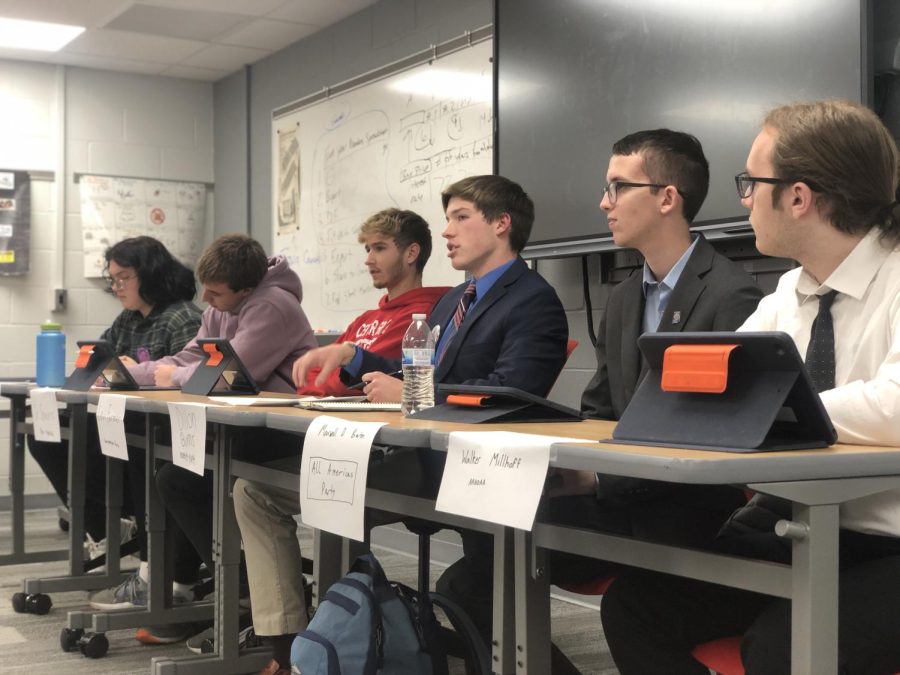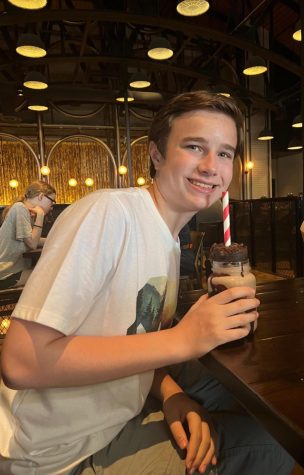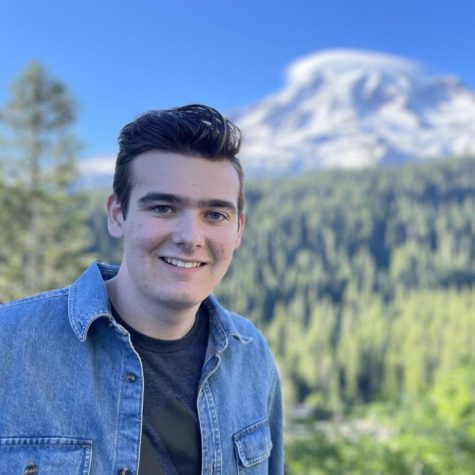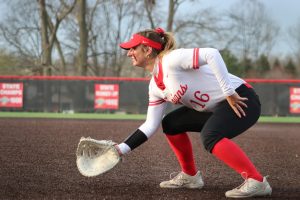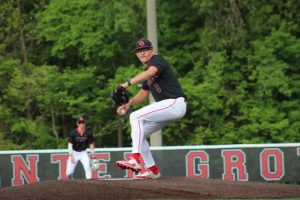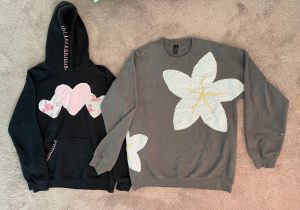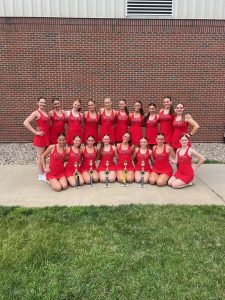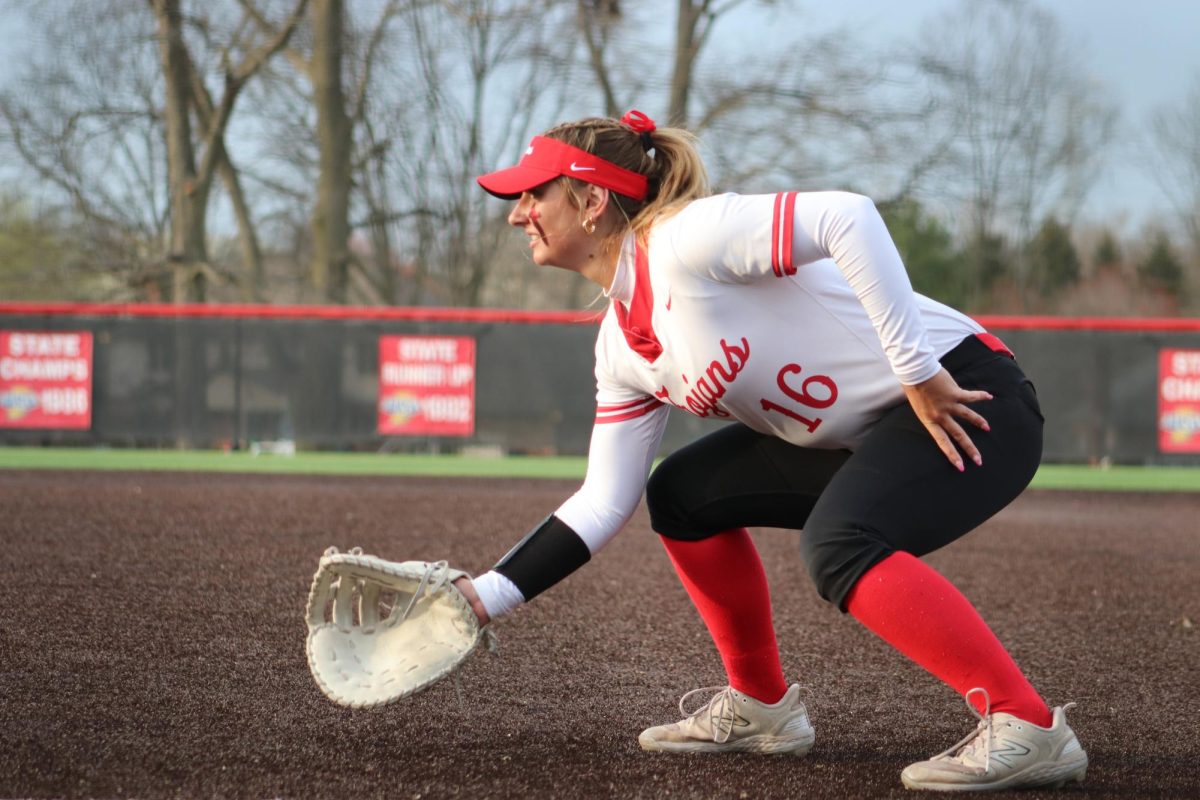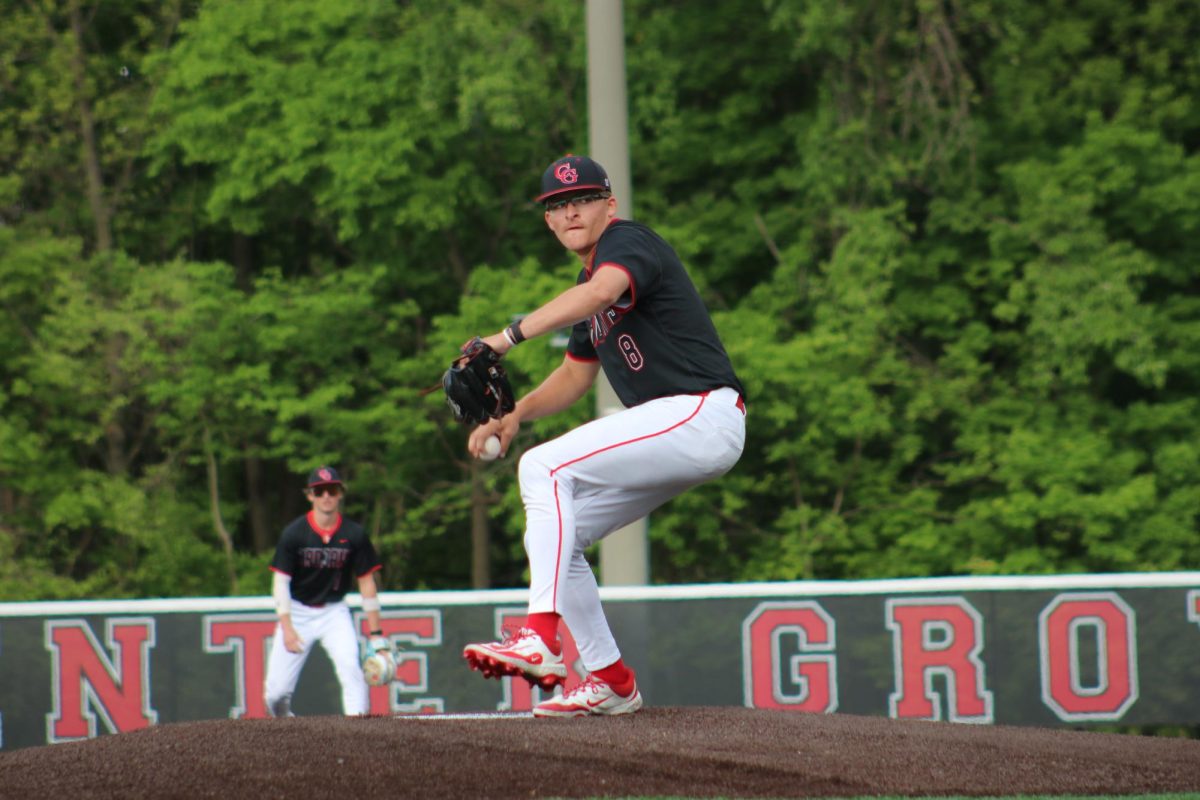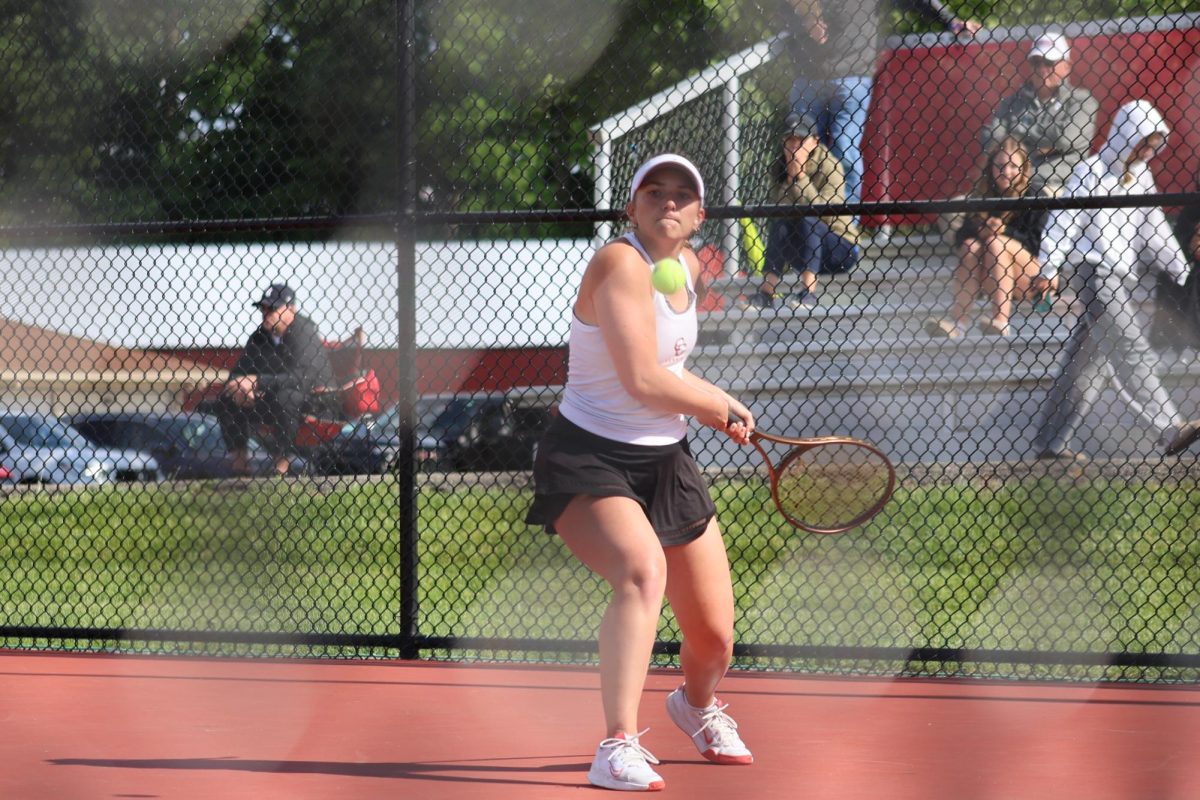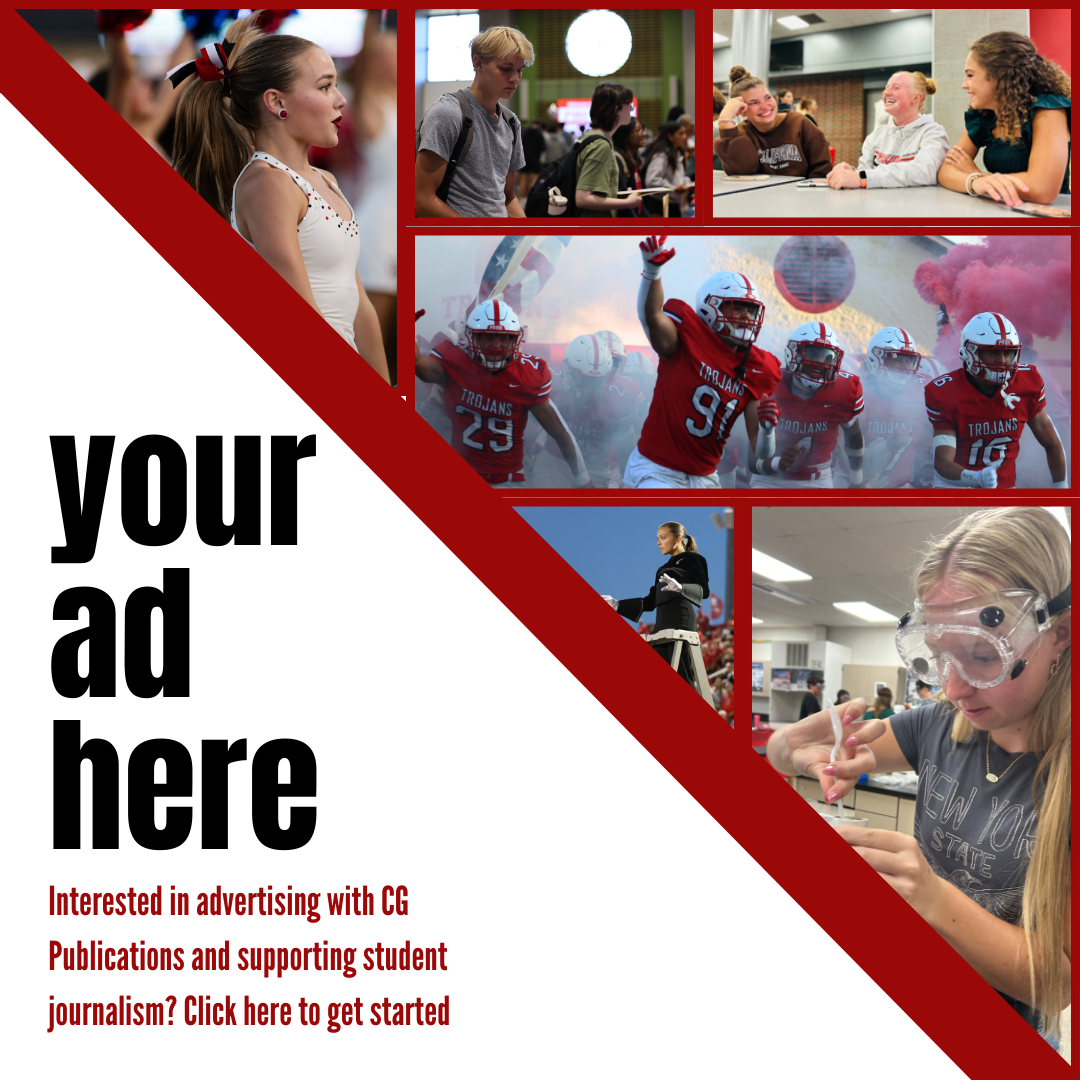Election education
AP U.S. Government students create mock political parties, elect President
Presidential candidate Dillon Burns speaks during a debate on Nov. 18.
December 8, 2022
Calm declarations echo through a cracked door. A calculated retort flies back with evidence and statistics. In Cale Hoover’s AP U.S. Government class, six seniors – presidential candidates – are at odds, representing just their group’s theoretical political party. Hoover pays close attention and asks the next question to the students at the front. All of their classmates pay close attention to the research, campaigning and practice they have poured into this debate. Not long after, votes will be cast and counted, and a winner will be elected.
Every year, during the second nine weeks, Hoover’s AP U.S. Government class participates in a project where students work together, using their knowledge of politics and government, to create a theoretical third party.
“I guess you could say they’re competing with each other, and we’ll eventually have a class election,” Hoover said. “But within this party, they’re going to create a campaign slogan, create campaign flyers and create commercials. We’ll have a vice presidential speech. We’ll have a presidential debate. Each party will have a convention to present their candidate to the class, and then we’ll conclude with an election for President.”
Besides the careful planning and setup Hoover puts into the project, he also plays an interactive role in keeping the competition and each party’s campaign going.
“I will be the debate moderator,” Hoover said. “I’m also setting up and running the election. So I’m the behind-the-scenes person, like the county clerk who’s in charge of running the election: that’ll be me. I’ll be making sure the ballots are all produced. I have to make sure there’s no voter fraud. You know, I’ve got to make sure that everybody who’s voting, votes properly. No funny business in that. So just all those little things is just to keep things pointed in the right direction and encourage them and try to get them to come up with as many interesting ideas as they can.”
Each role plays an important part in preparing an effective campaign for the party. The President is the head of the party, and they are responsible for debating opposing groups.
“I’m the face of the party. I’m the President,” senior Thomas Duran, candidate for the Community Change Party, said. “I have to look good charismatically and I have to appeal to people. That’s going to look like me debating with other President candidates. That’s going to be me just interacting and discussing things with my public candidates. I just have to put on a good show really.”
The Vice President assists the President by spreading the platform of the party through speeches.
“I help work with the President, keeping our campaign going and advertising getting our party out there. We definitely have a pretty large say in the platform and beliefs that come with that. I will deliver a speech laying out our party for the rest of the class,” senior Ella Herron, vice president of the Prosperity Party, said.
Other supporting roles deliver the party’s policies and battle opponents behind the scenes. One example is the campaign manager, who creates promotional materials to hand out and designs the look of the campaign.
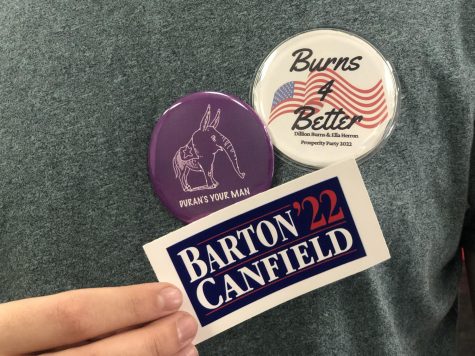
“I’m the campaign manager so I have to make some bumper stickers and logos, buttons and promotional things for the party to hand out at the convention. I think making bumper stickers and slogans was pretty fun. The whole design part of it has been pretty fun,” senior Haidyn Brooks, campaign manager for the Prosperity Party, said.
The project not only teaches students about the process of running a political party, but also highlights many of the aspects that only those involved in campaigns are aware of.
“We have a tendency to not be aware how much planning and thought and work goes into things,” Hoover said. “I think we always take that for granted when you’re not directly involved. So when you look at what goes into this, the amount of hours people spend… If you think you know about a candidate who’s traveling around, trying to talk to as many people as possible, they are putting a lot of time, energy and effort into these things, most of which we don’t see.”
The project brings together several of the topics students learn about in the class: interest groups, the media, campaign financing and partisanship. It also acts as AP Gov’s semester one final.
“Honestly, this project–it’s what AP Government is known for,” Herron said. “We’ve heard about this from prior years and I took this class because I do enjoy learning about the government and United States history.”
Each student who has joined the class looks forward to specific parts of the project as they learn more about the details. Hoover said students find the ads interesting.
“They like watching the commercials, especially if they’re attack ads, and they find them funny when they’re friends get attacked by other people,” Hoover said. “Their conventions that they put together are 10 to 15 minute presentations, and when those are really well done that’s probably what I enjoy the most. I do think it’s fun to walk around the room in the weeks that they’re working on these things, listening to their ideas and watching them go from point A to whatever that end results gonna be. Seeing how far things develop is always pretty interesting.”
Other students look forward to specific aspects of the project, like some of its major milestones.
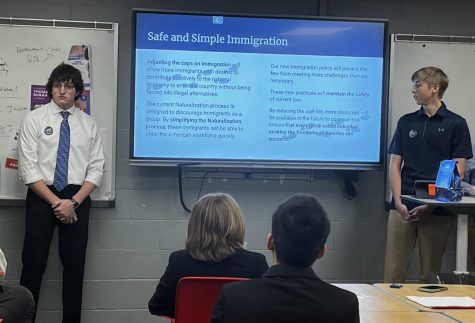
“The debate,” Duran said. “100% debate. I think it’s going be fun, especially because these aren’t things I specifically believe. I think it’s going to be nice approaching a more moderate stance on politics and then, of course, espousing those beliefs and really seeing that debated.”
Most of all, though, the project encourages students to not forget about government after they leave class but to stay interested in politics to nurture their participation in the political process.
“They’re 17- or 18-years old; they’re seniors,” Hoover said. “I would say about 1/4 of the class [got] to vote in this election. So that makes it naturally more appealing because they’re getting ready to start participating in these things. I think that sparks their curiosity. So I think all of those… lead to a group that’s more curious in the end.”


